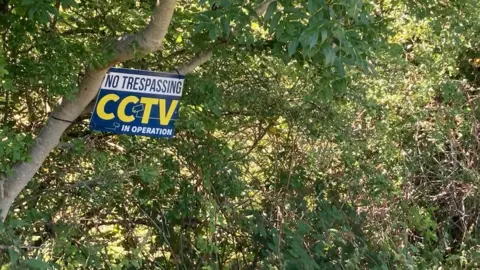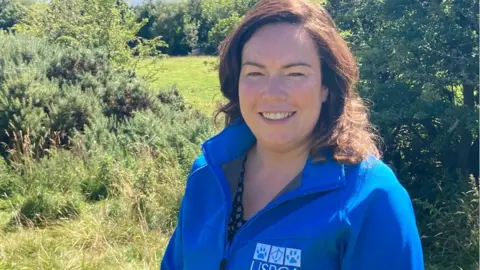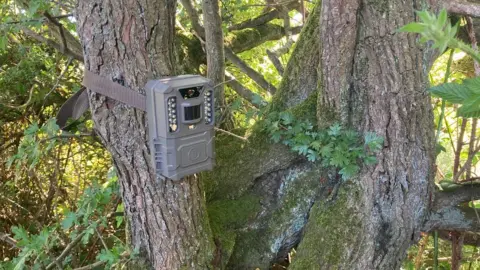Badger baiting prevention scheme commended
An initiative to prevent badger baiting in Northern Ireland has received a special commendation at the National Wildlife Crime Prevention Conference.
Sixteen badger setts have, so far, been protected by the volunteers who run Operation Brockwatch.
The scheme is led by the Ulster Society for the Prevention of Cruelty to Animals (USPCA) and the NI Badger Group (NIBG).
Under the scheme, landowners work with the groups and PSNI to protect setts.
CCTV cameras are set up and signage put in place to show the areas which have previously been targeted by criminal gangs and these are monitored 24/7.

Badgers are a protected species in Northern Ireland, so it is a criminal offence to disturb them or where they live.
"We started off with four setts here in Northern Ireland and we're now at 16 setts, so we really have gone from strength to strength through the last few years," said USPCA development manager Colleen Tinnelly.
"This crime is one of the most awful acts of cruelty that you can ever imagine."
Badger baiting involves a terrier-type dog with a tracker being sent down into a sett to corner a badger, which will then be dug out from above ground and attacked by other dogs.
The dogs often suffer injuries as well, as the badger fights for its life.
None of the 16 setts that are part of the initiative have been attacked since it began in 2019.

"All these setts are monitored with cameras and with signage, and also our volunteers are very active within these setts," she said.
"So we're very, very happy that this has done what we set out to do, and that is to protect our native wildlife here in Northern Ireland."
Volunteers like Peter Clarke play a crucial part in the initiative.
"I just have always loved badgers; I saw my first badger about 1967," said the founder member of the NI Badger Group.
"A lot of landowners do not want these people trespassing on their land. I mean, they're not only involved in badger digging and baiting, they would also be involved in a lot of other crimes.

"So the landowners are very happy to for us to work along with them, to set up this project on their land.
"We would keep in contact with them throughout and they are all interested in the badgers themselves."
The mostly-nocturnal mammals are fairly easy to spot.
They build a latrine or toilet area away from their sett, at the edge of their boundary. And each day, they bring their bedding of leaves, grass and moss out to air.
"They dig setts, they dig holes and then they've spoil heaps, they have their latrines, and you'd find bedding and all sorts of things," said Mr Clarke.
"You could see above the sett where they've been digging for worms. Badgers don't really hide themselves that well.
"You can also see in the tree where they've sharpened their claws, it's very clearly visible.
"They're a great animal. It's a great way to spend a summer night, sitting at a badger sett.
"It's even better than TV."

"We are very pleased that Operation Brockwatch has been recognised on a national level as an effective crime prevention strategy," said USPCA chief executive Brendan Mullan.
"Northern Ireland has tough animal welfare legislation in place - maximum five-year custodial sentences, lifetime bans from keeping animals and fines of up to £20,000.
"It's imperative that these individuals are caught and adequate sentencing is handed down by the courts.
"Together, we can send a clear message that there is no place for badger baiters in Northern Ireland."
The most recent police figures (2016-2018) show there were 81 reports of badger baiting, 65 reports of setts being disturbed and nine trap or snares detected over the three years.
The data also indicates a larger number of reports coming from south Down and County Armagh, although population density may account for the disparity.
